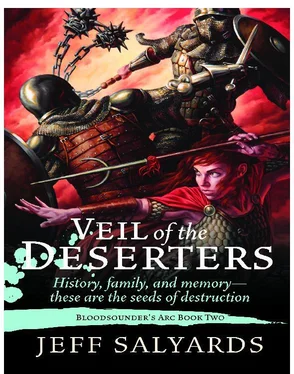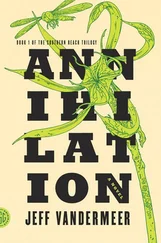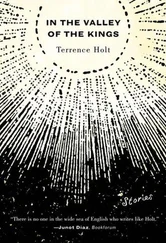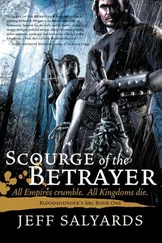Jeff Salyards - Veil of the Deserters
Здесь есть возможность читать онлайн «Jeff Salyards - Veil of the Deserters» весь текст электронной книги совершенно бесплатно (целиком полную версию без сокращений). В некоторых случаях можно слушать аудио, скачать через торрент в формате fb2 и присутствует краткое содержание. Жанр: Фэнтези, на английском языке. Описание произведения, (предисловие) а так же отзывы посетителей доступны на портале библиотеки ЛибКат.
- Название:Veil of the Deserters
- Автор:
- Жанр:
- Год:неизвестен
- ISBN:нет данных
- Рейтинг книги:3 / 5. Голосов: 1
-
Избранное:Добавить в избранное
- Отзывы:
-
Ваша оценка:
- 60
- 1
- 2
- 3
- 4
- 5
Veil of the Deserters: краткое содержание, описание и аннотация
Предлагаем к чтению аннотацию, описание, краткое содержание или предисловие (зависит от того, что написал сам автор книги «Veil of the Deserters»). Если вы не нашли необходимую информацию о книге — напишите в комментариях, мы постараемся отыскать её.
Veil of the Deserters — читать онлайн бесплатно полную книгу (весь текст) целиком
Ниже представлен текст книги, разбитый по страницам. Система сохранения места последней прочитанной страницы, позволяет с удобством читать онлайн бесплатно книгу «Veil of the Deserters», без необходимости каждый раз заново искать на чём Вы остановились. Поставьте закладку, и сможете в любой момент перейти на страницу, на которой закончили чтение.
Интервал:
Закладка:
“Lemonman cursed the younger Syldoon, pointed toward their encampment, yelled something else, and my father straightened up, red-faced. The Syldoon flipped his cloak back and reached for his sword, and my father’s eyes grew wide and then he fumbled for his. Not being a martial man, he would have been doomed even had he drawn his blade, even against a clearly drunken opponent, but he never got the chance. My father grabbed the hilt and pulled, but the peace cord was still tied and the sword didn’t move. But the young Syldoon had no such problems.”
“He didn’t have his cord tied?” I asked, and silently cursed myself, afraid any interruption would still him.
“No,” he replied. “He did not. The bastard’s blade slid free clean, flashed in the morning sun, and disappeared in my father’s belly. My father stared down in disbelief.
“It’s said that when some events occur, time stops. This moment was such a moment for me. Every detail-the mud on the hem of the Syldoon’s cloak, the stitching on my father’s satchel, the stillness of the air, the skeletal bareness of the trees in the distance, the yellow grass at their feet-all in my mind now as if I saw it this morning. In this way, the moment does last forever. But on that day, it didn’t, and time eventually returned, and chaos with it.
“I screamed, the Lemonman stepped back, his crate upended on the ground next to the broken jar, his hands waving in the air in front of him as if he could ward off what he was witnessing, I heard Soff wail, though I didn’t see from where. I wanted to grab a bottle off a table, to smash it and grind it in the Syldoon’s face, I wanted to run to my father, I wanted to run away, to do something, anything. But I couldn’t. I stood there, watched as the Syldoon pulled his sword out of my father’s belly, transfixed as my father dropped to his knees and fell forward, hand still on the hilt of his sword. I listened to the screaming, absently wondering if it was mine. And then my uncle Sirk moved past me, sword in hand, walking slowly, deliberately, heading toward the boy who had just stabbed his brother. And he looked like he belonged on a frieze himself-his face and eyes were stone.”
“He was a warrior, I take it.”
“You apprehend well. A vicious bastard in most ways, but a warrior of the highest order, to be certain. Another Syldoon soldier saw him coming, unlooped his sword and stepped in his path. Neither said a word. Sirk appraised the man, and then threw a blow from the high guard position, but it was a feint, and the blade whipped back down and to the right, cutting deep into the man’s exposed left leg. Before the Syldoon could even cry out the sword reversed directions, up and to the left again, slashing across the inside of the sword arm, cutting cloth, flesh, bone.
“The Syldoon dropped his sword and fell to the ground, unsure which wound to hold, and my uncle walked past him. Another Syldoon with a two-handed axe moved forward to intercept. He told Sirk to sheathe his sword but my uncle ignored him. Seeing his comrade dispatched so quickly, the soldier didn’t wait for Sirk to act. He closed in and delivered a blow straight down that, had it connected, would have split my uncle in two. But it didn’t. My uncle stepped to left and as the axe cleaved air, then moved forward.”
He tapped me on the lower stomach and made me jump. “The point of Sirk’s sword entered just above the man’s right hip and came out the other side. The soldier screamed and looked at his side dumbly. Sirk planted his left palm on the Syldoon’s chest and pushed him off his sword as he pulled it free. The man collapsed and curled into a ball and Sirk stepped over him as if he were a pile of steaming shit he didn’t want to risk soiling his shoes on, eyes focused on the man who had slain his brother. I had never witnessed my uncle in battle before, only having heard stories, but they had utterly failed to capture exactly how efficient, purposeful, and economical he was.”
He said this as if he wasn’t aware how neatly this assessment applied to himself.
“A trebuchet was no less awesome to behold in its controlled fury and mechanical purpose. My uncle imparted little to me, but he told me once that many men rage and scream during combat in the hopes of bolstering their abilities or devastating their foes’ courage, but the finest warriors were those who reined in emotion, who acted only with clean technique and clear purpose. So, in my mind, in that brief moment when he continued on so coldly as if he were walking alone in the woods, I imagined the entire Syldoon army advancing on Sirk, one man at a time, each of them dispatched with as little wasted movement as possible as he made his way casually to his revenge, and I laughed, laughed out loud like a man bereft of sense. And while I had several reasons to hate the man, for that single moment, I loved him.
“But then four more Syldoon moved to impede my uncle, swords raised, and the spell was broken. They demanded he disarm but he continued forward as if deaf. I saw two Vorlu run over to help him, and some Zundovu untied their peace cords to join the fray as well, although who they were going to attack I couldn’t guess. I grabbed a blue bottle then, too late, and ran to help my uncle and my father if I could.”
Quietly, I said, “But you didn’t make it.”
“But I didn’t make it,” he agreed. “I heard a bowstring hum and an arrow sprouted from the back of my uncle’s leg. He made a sound that I can only call a growl and spun around, still holding his bloody sword. I looked back to where the arrow had come from. The Syldoon commander was standing on a table, five archers beneath him, composite bows drawn, arrows nocked.
“The commander shouted, ‘Drop your weapons. All of you.’ All around the encampment tribals and Syldoon were armed and ready to kill each other. Sirk looked at the commander, looked at the archers, spat, and turned to face the Syldoon in front of him again. He took another step, dragging his wounded leg, and another arrow appeared in his lower back. He started to fall forward, planted his sword in the dirt and laid his weight on the pommel, holding the hilt with both hands. The sword bent but didn’t break.
“Soffjian ran over and stood between Sirk and the archers, covering his body with her own. The commander called out again, ‘I won’t say it a third time. Anyone who doesn’t obey will be shot. Drop your weapons.’”
“And did they?”
“It would have resulted in a bloodbath that cut my life short otherwise. Slowly people lowered their blades, slid them into scabbards. Sirk’s sword bent under him and snapped. Soff tried to grab him as he fell, but she wasn’t strong enough and he slumped over onto the ground. I ran over to them, realizing only after I got there that I still held the glass bottle stupidly in my hand. I dropped it and knelt next to them. His breathing was labored. There was a growing circle of blood around each arrow. Soff cradled his head in her lap and cried.
“I heard the commander again. ‘Vorlu, Zundovu, Bandovar. Return home. Return to your homes now. This Sanctuary is over.’ I looked over at my father, started to rise to go to him. He was motionless on his belly, head turned sideways. It’s often said that a gut wound is the worst kind. A man stabbed or shot by a bolt or arrow in the belly could linger for hours, even days, experiencing the most awful suffering imaginable, overtaken by fever, begging for death to claim him or his comrades to finish him off. But there are rare exceptions. Men who survive. Men who die quick. My father might not have been dead when he hit the ground, but something inside was cut deep, and he died fast, his eyes still very much open. And I sat down and wept harder than I have in my entire life as my dead father stared at me.”
Читать дальшеИнтервал:
Закладка:
Похожие книги на «Veil of the Deserters»
Представляем Вашему вниманию похожие книги на «Veil of the Deserters» списком для выбора. Мы отобрали схожую по названию и смыслу литературу в надежде предоставить читателям больше вариантов отыскать новые, интересные, ещё непрочитанные произведения.
Обсуждение, отзывы о книге «Veil of the Deserters» и просто собственные мнения читателей. Оставьте ваши комментарии, напишите, что Вы думаете о произведении, его смысле или главных героях. Укажите что конкретно понравилось, а что нет, и почему Вы так считаете.










